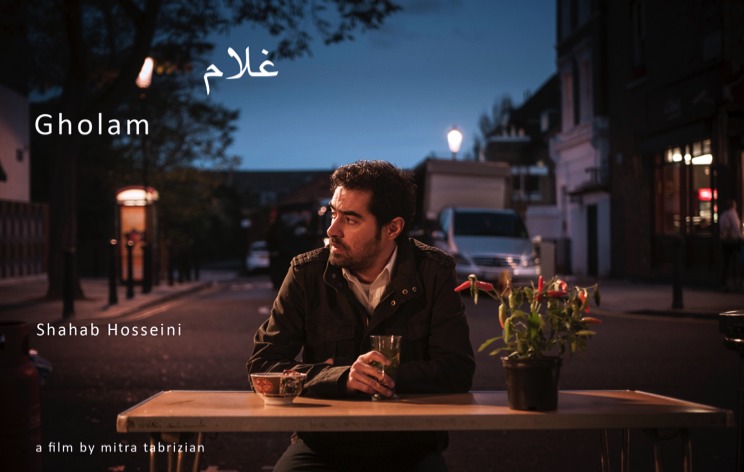Reviewed by Lee Hill
Gholam (Shahab Hosseini), the title character of this mordant portrait of an exile in extremis, is a shy, laconic Iranian military veteran in his 30s. He survives on the margins of the expatriate community in London by driving a mini-cab at night and odd jobs at a garage during the day. When not sleeping in a grim, mold encrusted studio flat, he spends his meagre free-time in a restaurant run by his uncle. While he strives to wear his burdens lightly, Gholam is treated largely with indifference or contempt by not just his self-absorbed customers, but his extended family. His response is to be a listener and he provides quiet friendship to his nephew, an aspiring rapper, and the garage owner, who mourns a lost bohemian life left behind in Iran. Assimilation eludes Gholam as he becomes more than an object of curiosity for the leader of a shadowy political group (Nasser Memarzia) keen to make use of Gholam’s dormant army skills.
Gholam, directed by Mitra Tabrizan and co-written by Cyrus Massoudi, shows London as it if often is to those who are not white or English or live in diminished circumstances. It is a landscape, vividly realised by Dewald Aukema’s cinematography, where the days seem locked in near permanent winter light and the largely sleepless nights are punctuated by dull yellow street lighting. This is the London whose parallel economy is one of zero contract jobs, struggling corner grocers that sell grass on the side or battle with their landlords raising the rent to extortionate new highs. In this London, fellow countrymen co-exist uneasily and have their own flawed pecking order to maintain status and dignity. It is Gholam’s lot to fall outside this sub-culture as well as the materialism of London at large.
Its main character passes through this landscape not unlike Travis Bickle in Martin Scorsese and Paul Schrader’s 1976 study of post-war alienation, Taxi Driver. Like Bickle, Gholam meets city dwellers who reveal their self-interest or self-absorption all too easily to a stranger simply trying to do his job. However, there the comparison stops. Tabrizan and Massoudi’s script is not interested in depicting a damaged man turning to violence for catharsis or reinventing Western film mythologies, but a survivor who struggles to move away from violence and is tragically betrayed by his essential decency.
“Your true country is where you are heading not where you are,”, a well-intentioned, but all too comfortable customer tells Gholam at one point. The problem is that Gholam knows all too well where he is going because it looks uncomfortably like where he came from. Through much of the film, Gholam is seen simply trying to be – enjoying the routine of a favourite meal, helping an elderly Afro-Caribbean woman reach her destination and above all, desperately struggling, to echo Hemingway, for a clean, well lighted place.
This verisimilitude of this striking debut feature benefits immeasurably from a cast familiar from Iranian arthouse hits such as The Salesman to unknown local actors. It makes the most of its small budget through a confident, pared down narrative that makes us identify with Gholam in a way that slicker dramas laden with backstory often fail to do. Delicately paced, Gholam the film takes as close to the interior of its haunted main character as we may wish to get. It is a tribute to the combined efforts of all involved that the cumulative effect of this film is not so much of a study of a forgotten man, but of a soul given release.
Director: Mitra Tabrizian
Writers: Mitra Tabrizian (Based on an original idea by), Cyrus Massoudi
Stars: Nasser Memarzia, Armin Karima, Shahab Hosseini
Gholam is in cinemas from Friday March 23th.
